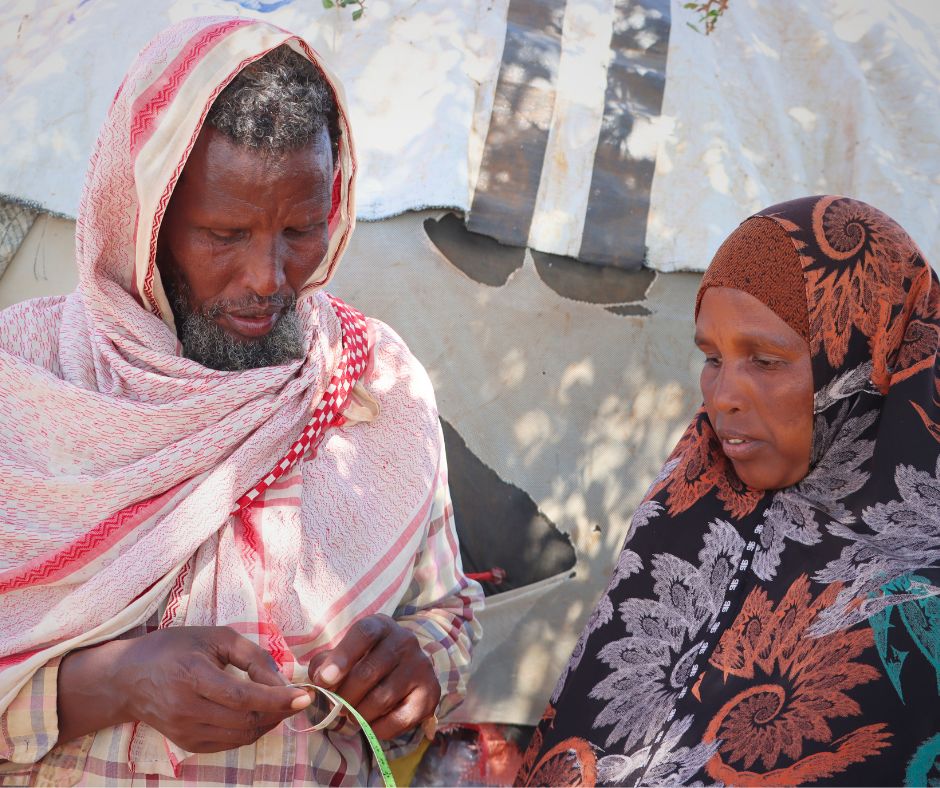Bilan, a 28-year-old expectant mother, is now in her second trimester and finds great comfort in the regular antenatal services provided at her Hilaac IDP camp 6 kilometers from Luuq district. Despite the distance from the Trocaire-operated district hospital, her former reliance on traditional birth attendants (TBAs) has changed through continuous education efforts from health workers. Drawing from her positive experience with her most recent delivery, Bilan has witnessed a remarkable change in maternal care. She is now resolute in her decision to seek professional antenatal support and ultimately deliver at a health center where skilled medical assistance is readily available.
” I gave birth at home twice with the assistance of a traditional birth attendant. In one instance was at risk of life-threatening hemorrhage, as TBAs lacked the necessary equipment, medication, or expertise to manage severe bleeding,” Bilan recounted.

However, her last delivery at the hospital in Luuq marked successful. While residing in the displacement camp, community health workers facilitated her connection to the health center, with which she has maintained regular contact since.
Somalia grapples with one of the world’s highest maternal mortality rates, with estimates suggesting that one in 20 women succumbs to pregnancy-related complications during their reproductive years. Recent data indicates a modest improvement, with the maternal mortality ratio decreasing from 1,044 per 100,000 live births in 2006 to 694 in 2020, representing a 44% reduction over this period. However, this progress remains insufficient to meet the Sustainable Development Goal target.
Maternal health crisis is a complex interplay of conflict, culture, and climate. Decades of war have devastated the healthcare system, leaving expectant mothers without crucial medical support. Some cultural practices such as female genital mutilation and home births significantly elevate risks. The recent Gu’ floods, following years of drought, have further ravaged communities and infrastructure, pushing quality maternal care even further out of reach for many women. This lethal combination of factors has transformed the natural process of childbirth into a precarious issue for countless Somali mothers.
The Caafimaad Plus consortium, Somalia’s largest health consortium comprising eight non-governmental organizations, maintains a geographical presence in hard-to-reach areas across every state in South Central Somalia. Trócaire, a partner of the Caafimaad Plus consortium, provides vital support to crisis-affected families like Bilan’s in Somalia’s Gedo region, right in her village.
With 1 million pounds of funding from the British Embassy Mogadishu to Caafimaad Plus in April, Trócaire supports two mobile health teams offering integrated healthcare services to affected families in remote locations. These services include health, nutrition, water, sanitation and hygiene (WASH), and protection assistance for those impacted by the Gu’ floods in Somalia.
The integrated life-saving project aims to safeguard the well-being of communities in flood-prone areas by providing comprehensive health services. These include outpatient clinical consultations, immunization, nutrition screening and management, and antenatal and postnatal care services through mobile clinic outreach to pregnant mothers facing challenges in accessing health facilities. This approach helps mitigate the adverse impact of flooding on maternal and child health while improving hygiene practices.
During her visit to the outreach site in her village on the 28 of July, an antenatal care counsellor assessed Bilan’s vital signs, performed a physical examination, and screened her for malnutrition. The examination revealed that Bilan was suffering from anemia and had not received the Tetanus Toxoid (TT) vaccination recommended for pregnant women.

Thanks to these mobile teams that bring these services directly to her camp, Bilan has received antenatal care in her village. She has benefited from regular check-ups, monitoring of her blood pressure and weight, vaccinations, iron and folic acid supplements, and nutritional counselling.
The deployment of mobile health teams in hard-to-reach communities underscores the commitment of Caafimaad Plus and the British Embassy in Mogadishu to combat maternal health challenges in crisis-affected areas of Somalia. The consortium’s integrated approach, combining health, nutrition, WASH, and protection services, reflects a holistic understanding of the interconnected challenges facing vulnerable communities.
2632 women including Bilan were provided with antenatal care services in the area since April this year of 2024.
Nasro, a midwife and antenatal care (ANC) counselor, has been working to support pregnant women in remote areas like Hilaac. After spending over two years in this area, she has gained an understanding of the challenges these women face.
“I am delighted to assist pregnant women who need healthcare services,” Nasro expressed. “We connect them to health facilities for delivery, and for other needs, we can handle it here.” Nasro’s words underscore her unwavering commitment to improving maternal health.
As Bilan approaches her due date, she can take comfort in knowing that her safety during delivery is further ensured by the availability of ambulance services. It significantly reduces the risk of delayed medical intervention, which is often a leading cause of maternal mortality. The ambulance is staffed with trained medical personnel who can provide initial care during transit, potentially making the difference between life and death in emergency situations.







